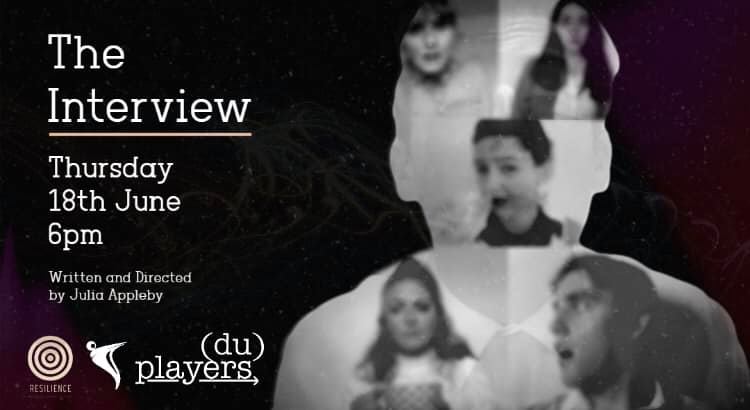DU Players’ Resilience virtual festival has been a theatre festival like no other, forcing writers, actors and directors to find new ways to produce and perform. Due to the new social norm, dictated as it is by social distancing and virtual interaction, many of the performance pieces are introspective and reflective solo works. That being said, some contributors have overcome these challenges using virtual resources in order to create plays involving multiple characters.
One such play is The Interview, a satirical comedy, written and directed by Julia Appleby. At about 50 minutes in length, it is one of the longer shows included in the Resilience festival. The format is like that of a video call, with characters coming “on stage” via screens. We only see their faces and, as a result, the acting is mostly limited to facial expression; the actors cannot move around the room or use their bodies as they would if they were performing on stage. It is a testament to their talent that The Interview is as engaging and entertaining as any on stage performance would be.
“Imagine a Zoom call with a dysfunctional, upper-class, English family. They are munching on custard creams, drinking gin and tonics, and speaking with crisp, moneyed, South British accents.”
Imagine a Zoom call with a dysfunctional, upper-class, English family. They are munching on custard creams, drinking gin and tonics, and speaking with crisp, moneyed, South British accents. The Interview opens with the youngest member of the family, Felicity Bright, who is played by Rua Barron. Felicity eats peanut butter from a jar and informs her father’s PR agent, Simone, of her plans to take a gap year after college – another staple of the upper-class English elite. Felicity’s older brother, Samuel, played by Luke Dalton, is spoiled and immature. He has recently been fired from his job at a law firm for “incompetency”, or, as he insists, “performance issues”. Delightfully, he is constantly snacking on custard creams, even, at one point, dunking them into his gin and tonic.
It soon transpires that their father, Harry Bright, is on the track to become prime minister, but has been caught in some unidentified, scandalous, career-ruining “incident”. He is about to try to recover his public image through a BBC interview, coached by the iPad wielding Simone. Eoghan Quinn plays Harry and the character is bumbling and clueless, with a Prince Charles-esque privileged naivety that barely contains his misogynism. Hannah Power, as Simone, is the competent and harassed PR assistant, asserting that things would be easier if they realised that she is “always fucking right”.
“Lainey O’Sullivan, as Anita, is a show stealer, and it is through her that Julia Appleby’s witty writing truly shines.”
Soon, Harry’s ex-wife and the children’s mother, Anita, arrives on screen. It is at this point that The Interview reaches its stride. Lainey O’Sullivan, as Anita, is a show stealer, and it is through her that Appleby’s witty writing truly shines. Polished and scathing, Anita orders Samuel to “make mummy a G and T”, insists that she hasn’t been upset recently, just “busy”, and despairs over the embarrassment that is her entire family. When Felicity protests at being lumped together with the others, Anita carelessly remarks,: “Oh give over sweetie, we all know you’re a lesbian.”
Into the brewing tension enters Keziah Keenan O’Shea as Emily, Harry’s new girlfriend, or mistress, depending on who’s speaking. She is cheerful, friendly, and clearly overwhelmed in this acerbic tongued family. The acting is skillful and the writing sharp. Efforts to delve into deeper reflections, like Felicity’s brief monologue about power towards the end of the performance, are less impactful than the engaging dynamic between the characters and the intelligent parody of the stereotype of a wealthy English family.
“The Interview may look like a video call, but Appleby and stage manager Sophie Coote manipulate the on-screen action to give the impression that the characters are physically together in the same space.”
The Interview may look like a video call, but Appleby and stage manager Sophie Coote manipulate the on-screen action to give the impression that the characters are physically together in the same space. Mugs and glasses are passed through the camera, and at one point an irate Felicity smears peanut butter across her father’s face. There is even a moment of abrupt passion, where two characters lean in simultaneously to kiss their cameras, and pull off clothing.
In many ways, this unusual format has the effect of making the audience feel even more involved in the performance, as all of the acting is directed towards your screen, at you. We receive the full force of the actors’ emotions, reactions, and expressions. The Interview is innovative, funny and dripping in sarcasm, proving that Covid-19 will not stop creatives finding ways to share and voice their art.






